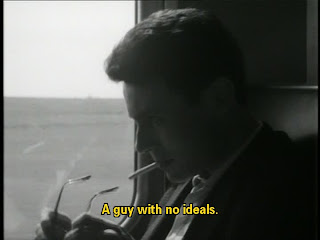Le Petit Soldat is an interesting entry in Godard's ouevre. His second film, it is both a continuation and a departure from the themes explored in the kinetic cinematic celebration that is Breathless. Although the film is political in both form and content to use Comolli/Narboni's terms, there is little here that foreshadows the kinds of politicized films we are now considering in class. The blunt depiction of torture (which resulted in France banning the film until 1963) is provocative and disturbing, yet its effect intentionally undermined by the Bruno's voiceover. On the other hand, despite the film looking very similar to Breathless – i.e., jump cuts, shooting on location – the tone and focus shift squarely on the existential ennui of Bruno Forestier. If anything, Michel Poiccard's existential queries are the main thematic link between Breathless and Le Petit Soldat.
The setting of Geneva is also significant. As Douglas Morrey notes, Geneva is a city apart: too Swiss to be considered French, and too French to be considered Swiss. Forestier's voiceover describes the city being divided by two lakes. The film then can be a read in terms of a grey area between two defined regions, politically and metaphorically speaking. This ambiguity extends to the soundtrack, composed of dissonant piano music that refuses to resolve to either major or minor tonality – or any certain tonality at all.
Le Petit Soldat is essentially dealing with a world in which Bruno does not fit – he is asked to perform tasks to which ends he does not subscribe to and suffers the consequences for not completing these tasks – at the hands of both the French secret service and an Algerian terrorist group. We never learn why he deserted, although it isn't hard to venture a guess. As he describes himself in voiceover, he is a man without ideals, and is constantly questioning the nature of his existence. This in turn complicates his relationship to the world around him. The voiceover divulges his ambivalence toward the situation at hand – even when he being tortured by his Algerian captors he admits via voiceover that he doesn't even know why he is withholding the information being asked of him.
Forestier's hesitation to kill his target reminds me of Meursault in Albert Camus' The Stranger, which is set in French Algiers. The indifferent murder of the Arab man by Meursault is now replaced by the irrational indifference to the political/military aim represented by Bruno's assassination attempts. Perhaps this comparison is too forced though, as Bruno (and Godard) later dismisses Camus during his long speech at Veronika Dreyer's apartment, and in fact does end up assassinating his target with the voiceover suggesting that he has come to a personal awakening of sorts.
Anyone familiar with the work of director Claire Denis will recognize the name Bruno Forestier from Claire Denis's Beau Travail. Denis appropriated the character (also played by Michel Subor) as head of a small French Foreign Legion unit stationed in Djibouti. The force's presence and their barracks are an anachronistic vestige of France's imperial ambitions in the region. Denis' concerns with the outsider are of relevance here as the film resonates a similar kind of existential isolation. The film contains numerous allusions to Le Petit Soldat, which I will post soon as my Beau Travail DVD isn't working at the moment. It's important to note here that these allusions are not solely referential but constitute a thematic link between the two films: the lost ideal and the political, psychological and moral quandaries that accompany this state.
More stills soon!
Ian









I can't figure out why some of the text is black.. I apologize for the inconvenience. Highlighting it will do.
ReplyDelete